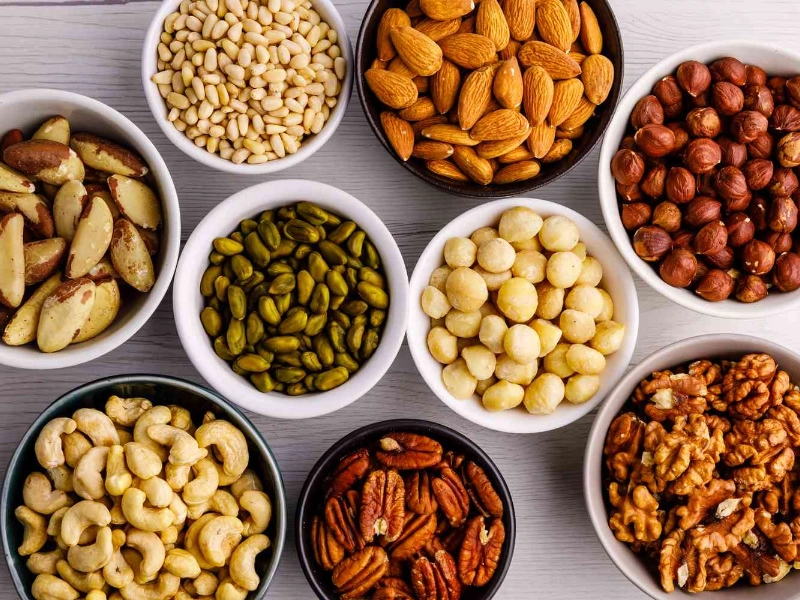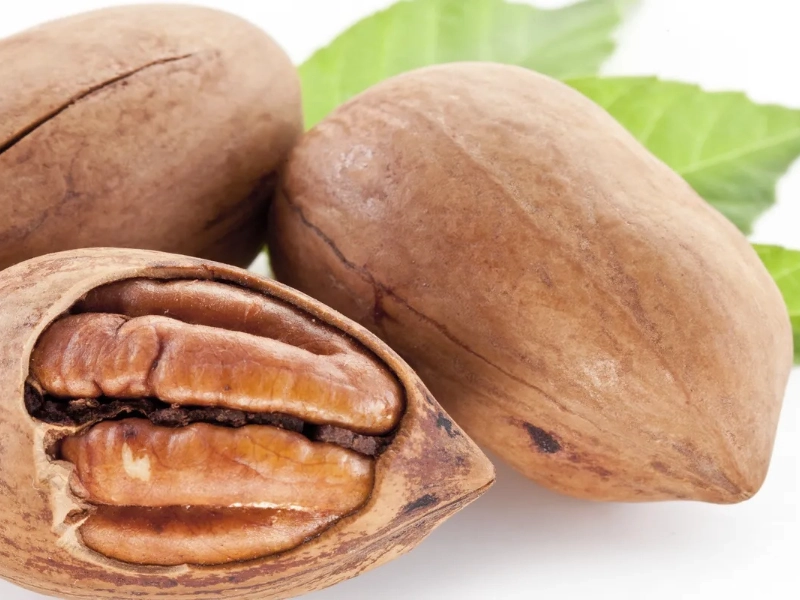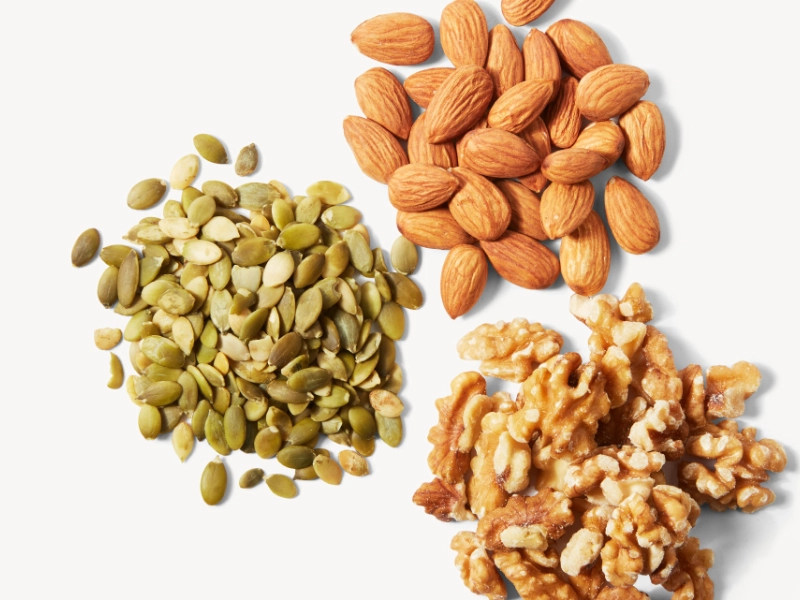Advertisement

Advertisement
1. Realising Type 2 Diabetes A chronic illness, type 2 diabetes influences how the body converts glucose—the blood sugar. It results from the body's resistance to insulin or from a failing pancreas producing insufficient insulin. Those with type 2 diabetes must control their blood sugar levels if they are to avoid problems including kidney damage, heart disease, and nerve problems. Managing this disorder mostly depends on diet, hence include nuts into regular meals might have various advantages.
2. Nutritional Evaluation of Nuts Nutrient-dense meals loaded in good fats, protein, fibre, vitamins, and minerals are nuts. Common kinds are cashews, walnuts, pistachios, and almonds. The monounsaturated and polyunsaturated fats found in nuts, mostly help heart health. Furthermore low in carbs, almonds make a wise alternative for keeping steady blood sugar levels. Their mix of protein and fibre helps create satiety, which can support weight control—a necessary component of diabetic care.

3. Healthy Fats: Their Function For those with type 2 diabetes, the beneficial fats in nuts can increase insulin sensitivity—a critical need. Insulin sensitivity is the degree to which the body lowers blood sugar levels via insulin. Studies of diets high in healthy fats have indicated improved glycaemic management. Changing saturated fats for unsaturated ones, such those found in nuts, can also help lower the risk of cardiovascular diseases—more common in patients with diabetes.
4. Content of Fibre and Blood Sugar Management Excellent sources of dietary fibre, nuts help control blood sugar levels by themselves. Fibre reduces the absorption of sugar in the bloodstream, so avoiding blood glucose surges following meals. This slow release of sugar lowers the danger of hyperglycemia and helps to preserve steady energy level. Including nuts as a snack or component of meals will help to greatly increase daily fibre consumption, thereby boosting general digestive health as well.

5. Inflammatory agents and antioxidants Rich in antioxidants, nuts assist to fight oxidative stress and body inflammation. Type 2 diabetes's development as well as insulin resistance have been linked to chronic inflammation. Including nuts in the diet helps people take advantage of their anti-inflammatory qualities, so perhaps enhancing insulin sensitivity and general metabolic condition. Walnuts, for instance, are very heavy in omega-3 fatty acids, which have been shown to lower inflammation.
6. Doable Strategies for Including Nuts Into Your Diet Including nuts into your everyday diet is easy and flexible. One can consume them raw, roasted, or mixed into different cuisine. For extra texture and nutrients, think about including chopped nuts into muesli, yoghurt or salads. Spread on whole-grain bread or used as a dip for fruits and vegetables, nut butters—such as almond or peanut butter—can be Since nuts are calorie-dense, portion control is crucial; usually, a modest handful—about one ounce—is appropriate serving size.
7. Selecting the Appropriate Nuts Although all nuts have health advantages, some may be better for controlling type 2 diabetes. Particularly abundant in vitamin E and magnesium, both of which help regulate blood sugar, almonds are Walnuts have omega-3 fatty acids; pistachios have less calories and more potassium. Select unsalted and unflavoured versions to cut added sugars and too high sodium levels, which could be bad for your health.

8. Possible Thoughts Although nuts can be helpful, those with type 2 diabetes should keep an eye on their total calorie count and carbohydrate consumption. A healthy diet comprising several food categories should incorporate nuts among other things. See a certified dietitian or healthcare practitioner to assist customise food choices to fit personal preferences and needs, so making sure nut intake helps general diabetic control.
9. Synopsis of advantages Including nuts into the diet might help greatly control type 2 diabetes. Their antioxidant qualities, fibre, and good fats help to lower inflammation, increase insulin sensitivity, and manage blood sugar. Nutrients density and adaptability make nuts a great supplement to a diabetic diet. People can improve their health and well-being by choosing wisely and adding nuts in a balanced diet, therefore controlling their diabetes.

 3. Healthy Fats: Their Function For those with type 2 diabetes, the beneficial fats in nuts can increase insulin sensitivity—a critical need. Insulin sensitivity is the degree to which the body lowers blood sugar levels via insulin. Studies of diets high in healthy fats have indicated improved glycaemic management. Changing saturated fats for unsaturated ones, such those found in nuts, can also help lower the risk of cardiovascular diseases—more common in patients with diabetes.
4. Content of Fibre and Blood Sugar Management Excellent sources of dietary fibre, nuts help control blood sugar levels by themselves. Fibre reduces the absorption of sugar in the bloodstream, so avoiding blood glucose surges following meals. This slow release of sugar lowers the danger of hyperglycemia and helps to preserve steady energy level. Including nuts as a snack or component of meals will help to greatly increase daily fibre consumption, thereby boosting general digestive health as well.
3. Healthy Fats: Their Function For those with type 2 diabetes, the beneficial fats in nuts can increase insulin sensitivity—a critical need. Insulin sensitivity is the degree to which the body lowers blood sugar levels via insulin. Studies of diets high in healthy fats have indicated improved glycaemic management. Changing saturated fats for unsaturated ones, such those found in nuts, can also help lower the risk of cardiovascular diseases—more common in patients with diabetes.
4. Content of Fibre and Blood Sugar Management Excellent sources of dietary fibre, nuts help control blood sugar levels by themselves. Fibre reduces the absorption of sugar in the bloodstream, so avoiding blood glucose surges following meals. This slow release of sugar lowers the danger of hyperglycemia and helps to preserve steady energy level. Including nuts as a snack or component of meals will help to greatly increase daily fibre consumption, thereby boosting general digestive health as well.
 5. Inflammatory agents and antioxidants Rich in antioxidants, nuts assist to fight oxidative stress and body inflammation. Type 2 diabetes's development as well as insulin resistance have been linked to chronic inflammation. Including nuts in the diet helps people take advantage of their anti-inflammatory qualities, so perhaps enhancing insulin sensitivity and general metabolic condition. Walnuts, for instance, are very heavy in omega-3 fatty acids, which have been shown to lower inflammation.
6. Doable Strategies for Including Nuts Into Your Diet Including nuts into your everyday diet is easy and flexible. One can consume them raw, roasted, or mixed into different cuisine. For extra texture and nutrients, think about including chopped nuts into muesli, yoghurt or salads. Spread on whole-grain bread or used as a dip for fruits and vegetables, nut butters—such as almond or peanut butter—can be Since nuts are calorie-dense, portion control is crucial; usually, a modest handful—about one ounce—is appropriate serving size.
7. Selecting the Appropriate Nuts Although all nuts have health advantages, some may be better for controlling type 2 diabetes. Particularly abundant in vitamin E and magnesium, both of which help regulate blood sugar, almonds are Walnuts have omega-3 fatty acids; pistachios have less calories and more potassium. Select unsalted and unflavoured versions to cut added sugars and too high sodium levels, which could be bad for your health.
5. Inflammatory agents and antioxidants Rich in antioxidants, nuts assist to fight oxidative stress and body inflammation. Type 2 diabetes's development as well as insulin resistance have been linked to chronic inflammation. Including nuts in the diet helps people take advantage of their anti-inflammatory qualities, so perhaps enhancing insulin sensitivity and general metabolic condition. Walnuts, for instance, are very heavy in omega-3 fatty acids, which have been shown to lower inflammation.
6. Doable Strategies for Including Nuts Into Your Diet Including nuts into your everyday diet is easy and flexible. One can consume them raw, roasted, or mixed into different cuisine. For extra texture and nutrients, think about including chopped nuts into muesli, yoghurt or salads. Spread on whole-grain bread or used as a dip for fruits and vegetables, nut butters—such as almond or peanut butter—can be Since nuts are calorie-dense, portion control is crucial; usually, a modest handful—about one ounce—is appropriate serving size.
7. Selecting the Appropriate Nuts Although all nuts have health advantages, some may be better for controlling type 2 diabetes. Particularly abundant in vitamin E and magnesium, both of which help regulate blood sugar, almonds are Walnuts have omega-3 fatty acids; pistachios have less calories and more potassium. Select unsalted and unflavoured versions to cut added sugars and too high sodium levels, which could be bad for your health.
 8. Possible Thoughts Although nuts can be helpful, those with type 2 diabetes should keep an eye on their total calorie count and carbohydrate consumption. A healthy diet comprising several food categories should incorporate nuts among other things. See a certified dietitian or healthcare practitioner to assist customise food choices to fit personal preferences and needs, so making sure nut intake helps general diabetic control.
9. Synopsis of advantages Including nuts into the diet might help greatly control type 2 diabetes. Their antioxidant qualities, fibre, and good fats help to lower inflammation, increase insulin sensitivity, and manage blood sugar. Nutrients density and adaptability make nuts a great supplement to a diabetic diet. People can improve their health and well-being by choosing wisely and adding nuts in a balanced diet, therefore controlling their diabetes.
8. Possible Thoughts Although nuts can be helpful, those with type 2 diabetes should keep an eye on their total calorie count and carbohydrate consumption. A healthy diet comprising several food categories should incorporate nuts among other things. See a certified dietitian or healthcare practitioner to assist customise food choices to fit personal preferences and needs, so making sure nut intake helps general diabetic control.
9. Synopsis of advantages Including nuts into the diet might help greatly control type 2 diabetes. Their antioxidant qualities, fibre, and good fats help to lower inflammation, increase insulin sensitivity, and manage blood sugar. Nutrients density and adaptability make nuts a great supplement to a diabetic diet. People can improve their health and well-being by choosing wisely and adding nuts in a balanced diet, therefore controlling their diabetes.